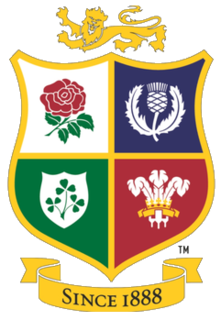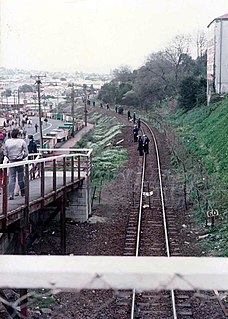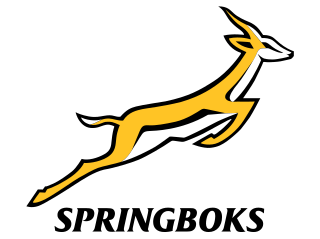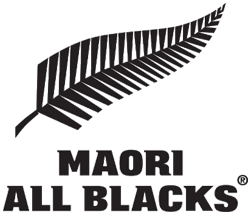
The British & Irish Lions is a rugby union team selected from players eligible for the national teams of England, Ireland, Scotland, and Wales. The Lions are a test side and most often select players who have already played for their national team, although they can pick uncapped players who are eligible for any of the four unions. The team currently tours every four years, with these rotating between Australia, New Zealand and South Africa in order. The most recent test series, the 2021 series against South Africa, was won 2–1 by South Africa.

The New Zealand men's national rugby union team, commonly known as the All Blacks, represents New Zealand in men's international rugby union, which is considered the country's national sport. The team won the Rugby World Cup in 1987, 2011 and 2015.

The 1981 South African rugby tour polarised opinions and inspired widespread protests across New Zealand. The controversy also extended to the United States, where the South African rugby team continued their tour after departing New Zealand.

The South Africa national rugby union team, commonly known as the Springboks, is the country's national team governed by the South African Rugby Union. The Springboks play in green and gold jerseys with white shorts, and their emblem is the native antelope springbok. The team has been representing South Africa in international rugby union since 30 July 1891, when they played their first test match against a British Isles touring team. They are currently ranked the number one mens team by World Rugby and are the only team besides the All Blacks to have won the Rugby World Cup on three occasions.

The Australia national rugby union team, nicknamed the Wallabies, is the representative national team in the sport of rugby union for the nation of Australia. The team first played at Sydney in 1899, winning their first test match against the touring British Isles team.

The Zimbabwe national rugby union team, nicknamed the Sables, represents the African nation of Zimbabwe in international competition, and is administered by the Zimbabwe Rugby Union. While sides representing the colony of Rhodesia have played as early as 1910, the modern day Zimbabwe rugby team did not play its first test until 1981, against Kenya. Zimbabwe has competed in two World Cups, in 1987 and 1991, in place of South Africa, who were sanctioned by the IRB at the time due to apartheid. Zimbabwe is categorized as Tier 3 Development One, which prioritizes Zimbabwe over other nations due to historical success as well as popularity of rugby in the nation.
Halt All Racist Tours (HART) was a protest group set up in New Zealand in 1969 to protest against rugby union tours to and from South Africa. Founding member Trevor Richards served as president for its first 10 years, with fellow founding member John Minto then serving as president until South Africa dismantled apartheid in the early 1990s.

The Māori All Blacks, previously called the New Zealand Māori, New Zealand Maoris and New Zealand Natives, are a rugby union team from New Zealand. They are a representative team of the New Zealand Rugby Union, and a prerequisite for playing is that the player has Māori whakapapa (genealogy). In the past this rule was not strictly applied; non–Māori players who looked Māori were often selected in the team. These included a few Pacific island players and a couple of African descent. Today all players have their ancestry verified before selection in the team.

Rugby union in South Africa is a very popular team sport, along with cricket and football, and is widely played all over the country. The national team is among the strongest in the world and has been ranked in the top seven of the World Rugby Rankings since its inception in 2003. The country hosted and won the 1995 Rugby World Cup, and won again in 2007 and 2019.
The Cavaliers was an unofficial New Zealand rugby union team which toured South Africa in 1986. Because of the Apartheid policies of the South African government, the official New Zealand Rugby Union tour scheduled for 1985 was cancelled, and the Cavaliers tour was very controversial in New Zealand.
1949 saw the second full tour of South Africa by a representative New Zealand rugby union team. The All Blacks achieved a record of 13 wins, 7 losses and 4 draws, and they lost the test series 4–0.

The 1921 South Africa rugby union tour of Australia and New Zealand was the third tour made by the Springboks rugby team, and their first tour to Australia and New Zealand. South Africa played three Test matches against the All Blacks. The series was drawn 1–all, and the long-running controversy between the countries over the All Blacks' inclusion of Maori players began.
Lloyd Clive McDermott, also known as Mullenjaiwakka, was an Australian barrister and rugby union player. He was the first Australian Aboriginal barrister and the second Aboriginal person to represent his country in rugby union, playing for the Wallabies against the New Zealand All Blacks in 1962. During South Africa's era of apartheid, McDermott made a principled decision to withdraw from the squad rather than play as an "honorary white" on a subsequent South African tour.

John Burns Smith was a New Zealand rugby union player, soldier, sportsman and baker. He was an All Black captain, and despite only playing nine matches is recognised as a great. His 26 appearances for the Second New Zealand Expeditionary Force rugby team, which toured the UK in 1946–47, earned him high praise. He also played for the New Zealand Māori, being of Ngāpuhi descent.
The 1960 New Zealand rugby union tour of South Africa, was a series of rugby union match played by New Zealand national rugby union team in South Africa and Rhodesia.
Rugby union and apartheid had a complex and supportive relationship. From 1948 to 1994, international rugby relations with the country, and also the non-integrated nature of rugby within South Africa drew frequent controversy. South Africa remained a member of the International Rugby Board (IRB) throughout the apartheid era.

Rugby union has a long history in New Zealand. Today, New Zealand holds tier one status with World Rugby.
The History of the South Africa national rugby union team dates back to 1891, when the British Lions first toured South Africa where they played against South African representative sides. The South Africa national rugby union team played few international matches during a period of international sanctions due to apartheid. Since the end of apartheid in 1994, South Africa has once again fully participated in international rugby.

In 1992, the South Africa Springboks played a rugby union test match against the New Zealand All Blacks, which later became known as the Return Test. The match was played at Ellis Park Stadium in Johannesburg on 15 August 1992. It was named as the Return Test as it was South Africa's first test match since the International Rugby Board (IRB) had banned them due to apartheid.

In 1949, Rhodesia played a rugby union match against New Zealand as a part of the 1949 New Zealand rugby union tour of South Africa. The match was played on 27 July 1949 at Hartsfield Rugby Ground in Bulawayo, Southern Rhodesia. The final result was Rhodesia 10–8 New Zealand. As of 2019, this is the only time the All Blacks have been beaten by a non-Test nation and makes Rhodesia one of only eight countries to have won against the All Blacks.











